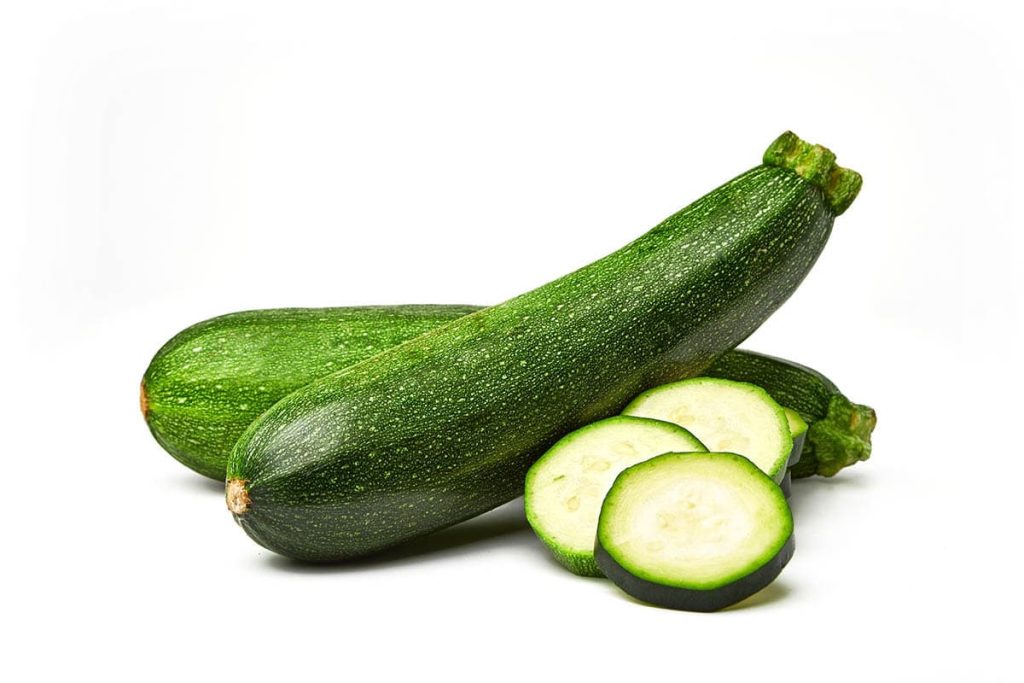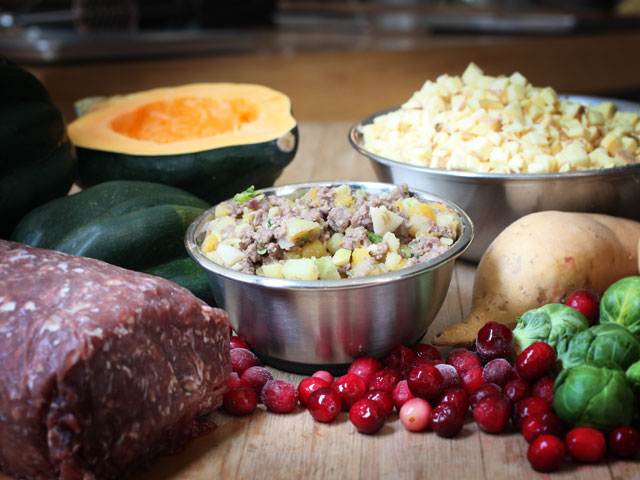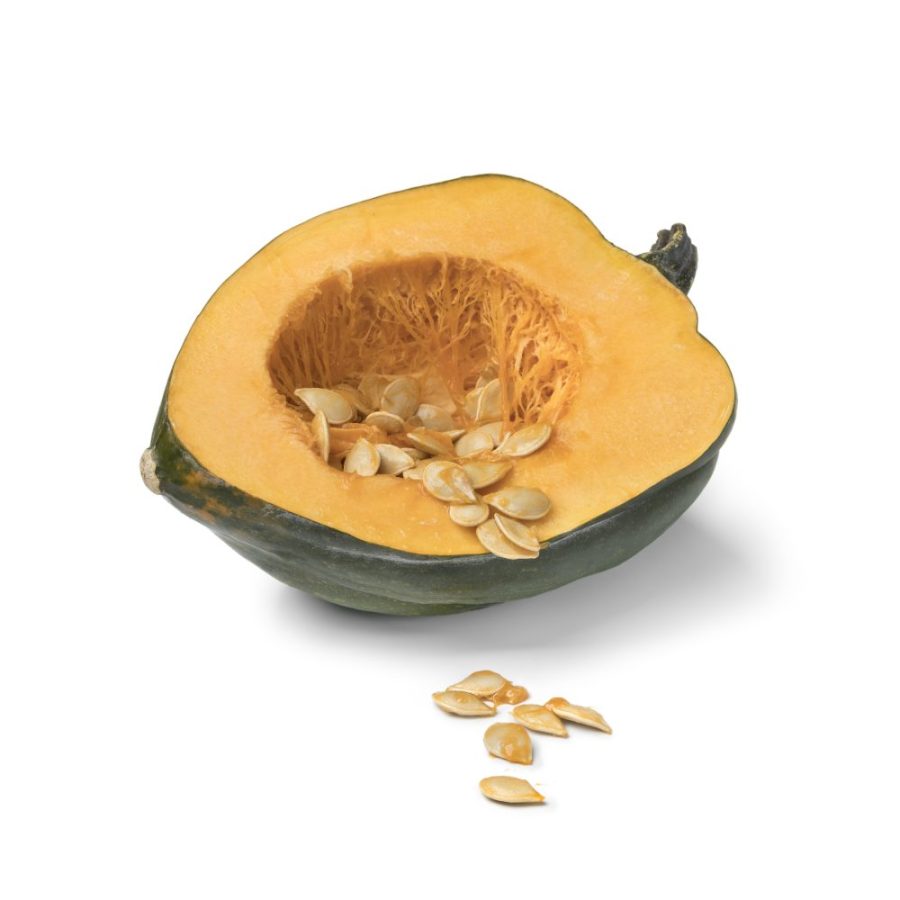Squash is a popular vegetable for many people and on many special occasions. As you’re carving that pumpkin for Halloween or preparing it for pumpkin pie on Thanksgiving, for example, you might be wondering if it’s okay to give your best buddy a little nibble. Is squash good for dogs?
Since many loving pet parents likes to share their favorite human foods with their furry friends, let’s take a closer look at whether dogs can eat squash, if they can, which types of squash they can eat, and is squash good for your pooch.
Can Dogs Eat Squash?

Can dogs eat squash? The short answer is yes, but, as with many foods, there are a few things to be aware of before sharing that tasty butternut squash or zucchini with your dog. While you might be accustomed to thinking that protein is the main ingredient in a dog’s diet, the truth is that, as part of a balanced diet, it should not exceed 30% of your dog’s food at any stage of life.
In fact, most healthy adult dogs only need about 18% of their diet to be in the form of proteins. Another 1 – 2% should be made up of fats, and a whopping 30 – 60% should be made up of carbohydrates, mostly in the form of veggies or fruit, like squash.
The majority of the carbohydrates are from plant-based sources like wheat, corn, barley, and oats. These are well-tolerated by dogs, can be converted into glucose to help maintain a healthy nervous system, and supply your pooch with energy. They also supply the majority of the soluble and insoluble fiber your dog needs for healthy digestion.
But there are other sources of carbohydrates that are even healthier for your best fried. Squash is one of those, and it can provide your dog with numerous health benefits. It’s important to take care of what kind of squash you feed and how much since not all squash is created equal.
What Types of Squash Can You Feed Your Dog?
According to Dr. Jerry Klein, the Chief Veterinary Officer for the American Kennel Club, you should always remove the seeds, skin, and rind before feeding your dog squash. You see, squash is a fruit, not a vegetable — not that your dog cares.
But you do need to care because it’s important to remove the squash seeds from the inside of the squash (that characteristic is what makes them a fruit). Additionally, you’ll want to remove the stringy bits before feeding it to your dog since those can cause digestive problems, like intestinal blockage or constipation.
That being said, squash is a particularly good choice for satisfying a dog’s hunger without adding too many calories since it’s low in calories and bulky, which means it will satisfy his appetite. Dr. Klein recommends that the best types of squash to feed are the following:
- butternut squash
- pumpkin
- zucchini
- acorn squash
You can also feed spaghetti squash and summer squash, also known as yellow squash.
You should not feed fried squash because the saturated fats of fried foods aren’t good for your furry friend. Aside from the same problems that eating fried foods causes in humans, they can also cause stomach problems in your dog.
Zucchini is the most easily digested by your dog’s digestive system, and it also helps increase water consumption. But Dr. Klein cautions pet parents not to feed pumpkin pie filling to their dogs. It often contains xylitol, an artificial sweetener that is toxic to dogs. Plain, unsweetened pumpkin is fine, but pumpkin pie filling is not.
What are the Health Benefits of Squash?

Squash has numerous nutritional benefits for your dog for various reasons. One of the biggest benefits of squash for dogs is that it is helpful for your dog’s digestive system since it is full of fiber, a key ingredient for keeping things moving. Second, it contains beta-carotene, a powerful antioxidant that helps counteract harmful free radicals and protect your dog’s cells from damage.
Squash is also high in vitamin A, which helps support your dog’s vision and cellular functions. Some varieties of squash, like butternut squash, are also rich in vitamin C, which helps your dog’s body repair its tissues. It also supports his immune system.
Other types of squash, like zucchini, are rich in vitamin B6. This vitamin is helpful for moderating your dog’s metabolism. Acorn squash is high in magnesium, which helps your dog’s body process other essential minerals and various B vitamins.
Moreover, most squash varieties are high in potassium and low in sodium and phosphorus. Butternut squash is also a good source of calcium and manganese for healthy bones and cartilage. Winter squash is also high in vitamin A, vitamin C, and folate, all of which are important for supporting dog health.
How Should You Prepare Squash for Your Dog?
The first thing to know about how to prepare squash for your dog is that you shouldn’t feed him raw squash. It isn’t toxic, but it can cause problems for your dog’s stomach. If you do feed raw squash, you’ll want to puree it and give your dog only small amounts.
As with any new food, it’s important to start slow and give your dog just small pieces of squash until he gets used to it. That’s particularly important for a small dog since larger pieces can be a choking hazard.
It’s also important to note that if you see any negative reactions, you should stop feeding it immediately and contact your veterinarian. With that being said, let’s look at the different ways you can feed squash to your dog.
How to Cook Squash
To cook squash, you can do it a couple of ways. It is particularly good roasted, and you can add it to a meat or kibble serving in that form. It can also be served steamed or baked. Pumpkin is particularly tasty for your dog if it’s baked.
You can also boil some varieties of squash, like yellow squash, and serve it as a treat once or twice a week. Whenever you’re preparing squash for your dog, however, it’s important to keep it simple.
You shouldn’t add seasonings like onion, salt, or garlic. Onions and garlic are toxic for your dog, and salt can cause or exacerbate certain health problems. Additionally, too much salt is toxic for your dog.
What are Other Fruits and Vegetables Your Dog Can Eat?
Your dog can eat other types of fruits and vegetables, but you have to watch out for some of them, as they can be toxic. Additionally, some foods, like cooked asparagus, provide no nutritional value for your dog, while raw asparagus is too tough for your dog to chew and digest.
Among the vegetables that are safe for your dog to eat are green beans, bell peppers, celery, and cucumbers. Additionally, broccoli and carrots are safe, as is cauliflower, but don’t give too much of the latter as that can cause gas.
Your dog can also eat lettuce, but watch out for pickles since the vinegar and salt on those can be a problem. As mentioned previously, onions are a no-no since they can cause problems with your dog’s kidneys.
Your dog can, however, eat Brussel sprouts, peas of all kinds (watch out for the canned peas, though), and sweet potatoes as well as regular potatoes as long as they’re not raw. Corn (not corncobs) is okay, too, as long as there’s no seasoning. That means no butter, no salt, and no pepper.
As far as fruits go, there’s squash, of course, and your dog can eat bananas, apples, kiwis, and oranges as long as you remove the seeds and the peels. Cantaloupe and other types of melons are okay as well without the seeks and rinds. You should only serve these occasionally, though, since they are high in natural sugar.
Blueberries, dates, and papaya are fine too, but watch out for those papaya seeds because they contain cyanide. You should not, however, give your dog cherries. Their seeds also contain cyanide, and it’s difficult to remove them.
Let Us Do the Cooking!
If you prefer to leave the cooking to someone else but still want to include healthy vegetables in your dog’s diet, JustFoodForDogs has several healthy food recipes your dog will love. There’s the venison and butternut squash variety, the fish and sweet potato recipe, or the sampler variety pack that includes both of those as well as the beef and russet potato recipe. We also have pumpkin dog treats for your pooch!
We make our recipes with whole foods and simple ingredients you can pronounce. There are no chemical preservatives or low-quality, disgusting ingredients that are common in many other dog food brands. They work with a team of veterinary nutritionists to create the healthiest dog foods for your best friend.
This content is for informational use only and does not replace professional nutrition and/or medical advice, diagnosis, or treatment. It is not a substitute for and should not be relied upon for specific nutrition and/or medical recommendations. Please talk with your veterinarian about any questions or concerns.
